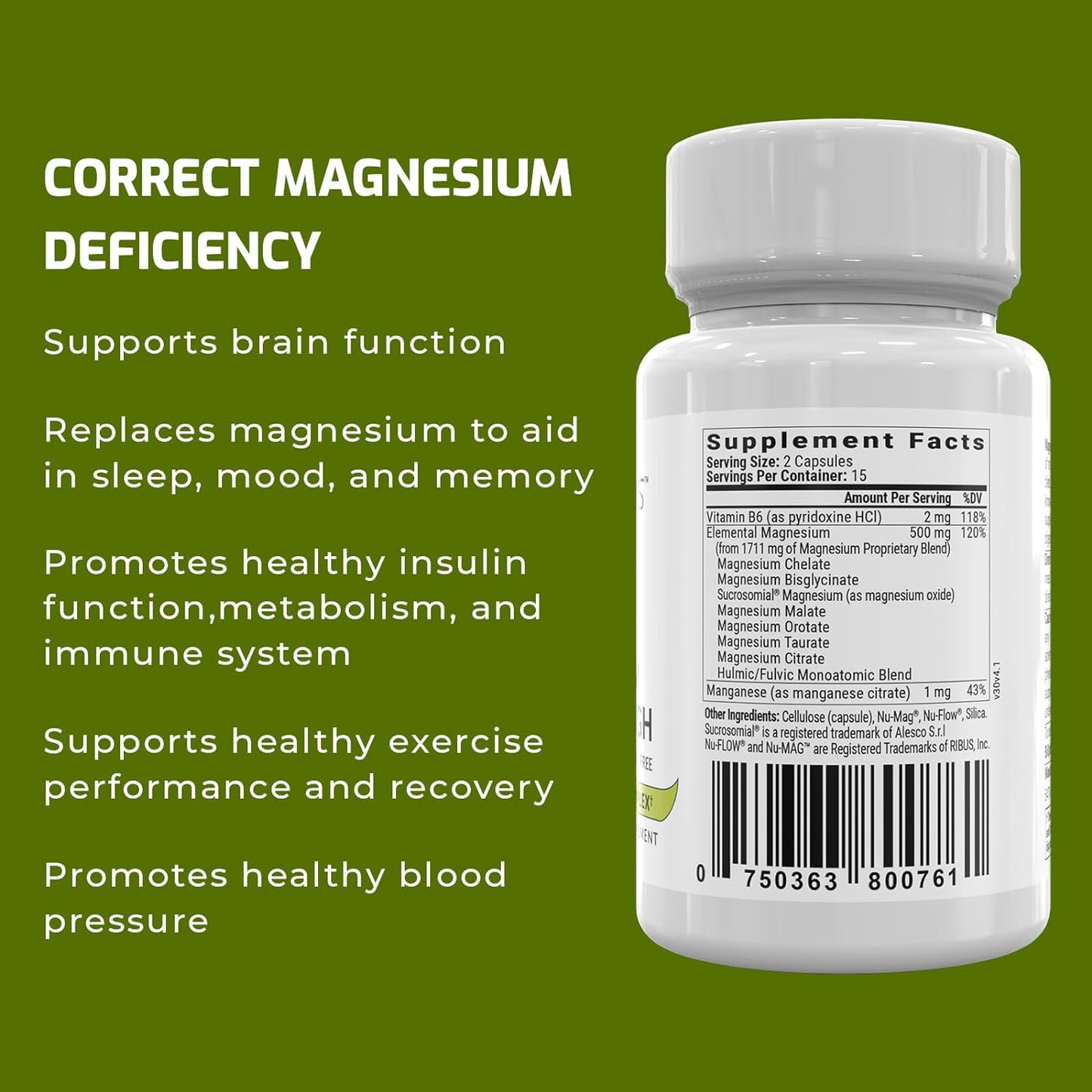BIOptimizers
Magnesium Breakthrough V4 (30ct)
Magnesium Breakthrough V4 (30ct)
Couldn't load pickup availability
- Best magnesium supplements for sleep
- Promotes a balanced stress response, feel relaxed and at peace
- Sleep faster and deeper
- A key nutrient for healthy immune responses
- Provides an essential electrolyte to maintain healthy rhythm
- Provides a key building block to strong bones
Share







Many Of Our Products Are
Why Magnesium Breakthrough?
Frequently Asked Questions
What is the B6 in Magnesium Breakthrough made from?
Vitamin B6 improves magnesium absorption and bioavailability. A clinical study compared the effects of magnesium with magnesium combined with B6. They found that subjects who were going through a lot of stress experienced 24% greater reduction in stress scores with magnesium and vitamin B6 compared with magnesium alone. The vitamin B6 in this product is made from carbohydrate fermentation (not potato starch).
Why does this magnesium supplement have rice in it?
When some ingredients are included in very small quantities (milligrams), a carrier substance is necessary. Stabilized rice flour is a naturally-occuring, hypoallergenic, and non-toxic medium that ensures you absorb these ingredients properly.
If you have a rice allergy, we recommend consulting your physician on whether to try this product. We do have a 90-day refund policy.
Can you empty the contents into your beverage?
Emptying the contents into a beverage/liquid will not alter magnesium absorption in the body but will definitely influence the taste and not in a good way.
We recommend taking Magnesium Breakthrough® with meals due to it’s laxative effect. If taken on an empty stomach, it may cause diarrhea.
What are the benefits of taking Magnesium Breakthrough?
- 7 types of magnesium makes it the most complete blend available
- Promotes a healthy stress response
- Improves sleep quality
- Supports brain function, memory, and cognitive function
- Helps muscle building and recovery
- Boosts exercise performance for athletes, the elderly, and people with suboptimal health
- Improves mood and mental health
- Improves blood sugar controll even in people with normal blood levels
- May relieve some PMS symptoms and promote hormonal wellbeing in women
Is this product safe for children?
No. The recommended daily allowance of magnesium for children 9-12 is 240 mg/day which is lower than included in Magnesium Breakthrough®.
How to take magnesium?
Magnesium Breakthrough is best taken on an empty stomach for best absorption. If you get an upset stomach taking it without food, you may want to take it with some food. The recommended daily dosage is 500 mg of elemental magnesium (2 capsules) for general health.
For maximum relaxation, cognitive, and physical performance, some people experience even more benefits when they gradually step their doses up to 5000 mg/day, broken into a few doses. Our bodies are intelligent and can tell how much magnesium you need if you continue to experience improved relaxation and wellbeing. You can take it at any time that works best for you. Taking it in the morning can boost mood by promoting calmness throughout the day. However, many people take it at night to relax before bed and promote more restful deep sleep.
What is the best magnesium supplement?
Not all magnesium supplements are created equal due to the differences in bioavailability.
Bioavailability correlates with health benefits. If the magnesium doesn’t reach your target tissue, you won’t reap the benefits from it.
Magnesium Breakthrough® provides the most bioavailable combination of different forms of magnesium in the market.
Can you take magnesium when pregnant?
For pregnant women, the German Nutrition Society recommends a daily magnesium intake of 310 mg (slightly above the recommended amount for non-pregnant women over the age of 25). This is in part because hormonal changes during pregnancy cause more magnesium to be excreted through the urine.
Please note that Magnesium Breakthrough is not formulated or tested for pregnant women. It’s best to consult your OB/GYN before introducing any supplements during pregnancy.
How to take magnesium for sleep?
To support sleep, take on an empty stomach 1 - 2 hours before bedtime.
How much magnesium should I take for sleep?
It depends on how deficient you are and your individual magnesium needs. If you’re under more physical or emotional stress, you may need more than an average person. Physical stressors include exercise and physical jobs. Vitamin D supplementation (which also helps with sleep) may also increase magnesium needs.[37]
The recommended daily allowance for magnesium is ~400 mg/day for men and ~310 mg for women. However, very few people get this dose from food. If you haven’t taken magnesium for a long time and are deficient, taking the RDA dose can be like filling up an empty pool with a spoon. Therefore, it may be a good idea to start at a higher than the RDA dose to correct the deficiency faster.[38]
Studies have shown benefits of magnesium supplementation from 125 mg to 2500 mg/day. You want to start with 1 - 2 capsules and slowly increase the dosage and observe your body’s response. If you have kidney problems or are on medications that may affect mineral balance (e.g. hypertension medication), it is important to speak to your physician before introducing a magnesium supplement.
Which magnesium is best for relaxation and sleep?
Magnesium chelate, glycinate, citrate, and malate can promote relaxation and sleep. Magnesium Breakthrough contains all of these forms of magnesium.
What can make you deficient in magnesium?
- Mental/emotional stress
- Hard physical exertions
- Caffeine intake
- Being diabetic, or obese
- High doses of vitamin D supplementation
- Calcium and other mineral supplements
- An unhealthy diet with a lot of processed foods
- Alcoholism
- Stomach acid-reducing drugs
- Bisphosphonate drugs for osteoporosis
- Some antibiotics
- Diuretic drugs and blood pressure-reducing drugs
- Kidney disease
- Old age
- Gut issues that affect magnesium absorption, such as Celiac and colitis
If you have a medical condition or are taking medications, consult your physician before introducing any supplements or getting off the medications.
What foods are high in magnesium?
These foods could be high in magnesium if they’re grown in soil that contains it. However, due to modern agricultural practices, most soils are low in magnesium.
- Green leafy vegetables
- Dark chocolate
- Avocado
- Nuts and seeds
Is magnesium better for sleep than melatonin?
Magnesium does different things than melatonin. Melatonin is a nighttime hormone that tells your body it is time to sleep. Whereas, magnesium helps promote a relaxation response as you find down to sleep. There is time and place for both. However, taking high-dose melatonin more than what your body produces (0.35 mg/night) can override your body’s own circadian response. Whereas, taking magnesium provides nutritional insurance to prevent deficiency, which will improve all aspects of health.
Are There Any Side Effects from Magnesium?
Excessive doses of magnesium can cause stomach upset and diarrhea. However, these are much more common with inorganic salts (oxide, chloride, and sulfate) than organic salts (glycinate, chelate, sucrosomial, malate, taurate, etc).
Should You Start Taking Magnesium For Sleep?
Everyone should take magnesium given that the modern lifestyle depletes it and the modern diet doesn’t provide enough. If you have suboptimal sleep, such as taking a long time to fall asleep, waking up tired, or feeling tired in the afternoon, magnesium may help improve your sleep quality.
More Wellness Options
Find exactly what you need! Explore related supplements tailored for a variety of health needs.
-
Magnesium Breakthrough V4 (30ct)
Vendor:BIOptimizersRegular price From $35.82Regular priceUnit price / per -
Magnesium Breakthrough V4 (60ct)
Vendor:BIOptimizersRegular price From $37.99Regular priceUnit price / per -
Magnesium Breakthrough Banana Mango Drink
Vendor:BIOptimizersRegular price From $38.99Regular priceUnit price / per














